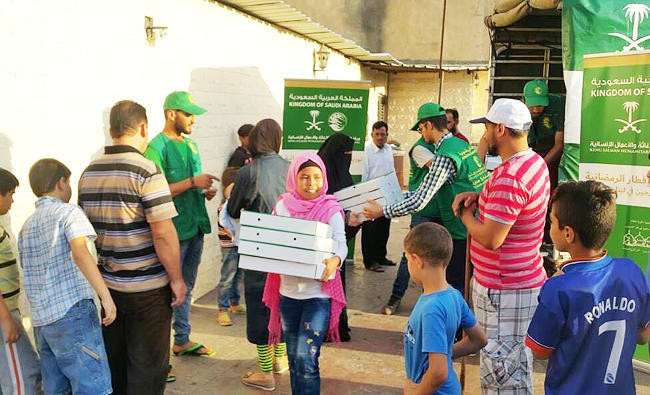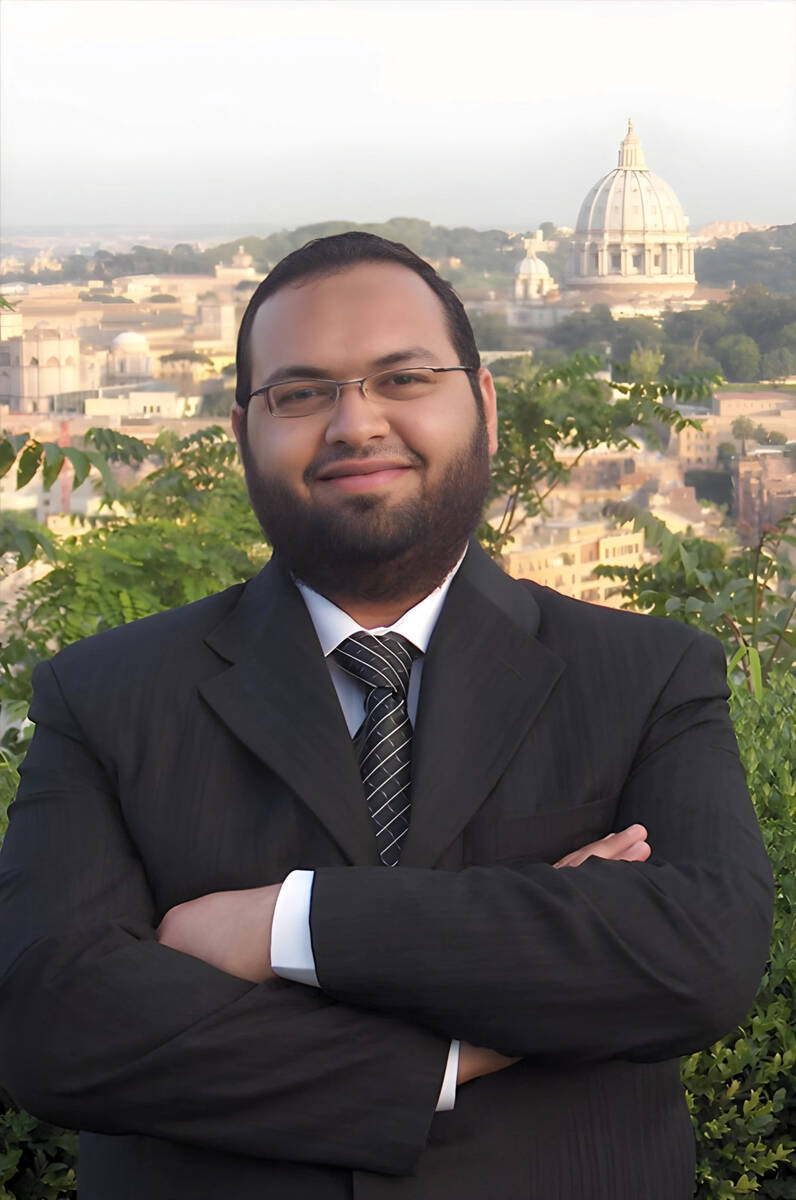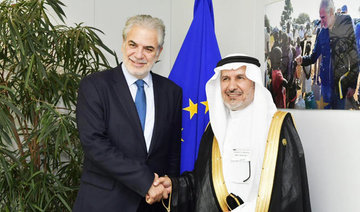JEDDAH: The UN is rapidly losing its credibility because of what experts say are its one-sided and questionable reports on the situation in Yemen.
“The problem is simple: The Houthis form only 2 to 3 percent of the Yemeni population, and yet these Iranian-supported militias are holding the entire country hostage at the point of a gun,” Dr. Hamdan Al-Shehri, a Riyadh-based Saudi political analyst and international relations scholar, told Arab News.
“The UN and the world community have become silent spectators to the crimes being committed by the Houthis and the mercenaries of (ousted President) Ali Abdullah Saleh,” he said.
He reminded the UN that Resolution 2216 is very clear. “It calls for three specific things: That Houthis should end the illegitimate occupation of Sanaa and other cities and return to where they came from; that they should hand over their weapons; and that they should become part of the political solution,” said Al-Shehri.
None of these conditions have been met, he said. “And the only countries trying to enforce the UN mandate are the Arab countries led by Saudi Arabia. And it is the Arab coalition that is being blamed by the UN.
“The UN and the world community have become silent spectators,” he said, pointing out that the Houthis have waged war against the Yemeni state six times in the past. “That is a criminal record in itself.”
He blamed the human rights organizations affiliated to the UN for overlooking basic facts: “The Houthis are the aggressors. They have been armed by Iran. The situation in Houthi-occupied areas is dire. The Houthis have forced children into the fighting. They are using extortion because they hold all the levers of power. There is no way to find out the atrocities that they have committed in areas under their rule because those areas are inaccessible to UN personnel and human rights organizations.”
Al-Shehri said it was a travesty that the UN was depending on reports written by the Houthis themselves. “How can the UN and its affiliate bodies rely on one-sided reports? This defies logic; it is unfathomable. The UN should depend on information provided by the legitimate and internationally recognized government of Yemen,” he said.
The UN was established primarily to support peace and security but the general perception is that since its inception, it has failed to make any positive breakthroughs on Arab and Islamic issues and even on some international conflicts.
“It plays the role of spectator and also plays a major role in breaking the rules and standards for which it was established,” said Al-Shehri.
When António Guterres took over as secretary-general, the UN witnessed a decline, and the organization became a hostage to false propaganda, said one veteran observer.
“The performance and effectiveness of the UN since Guterres assumed his duties has become weak and shaky and shown an inability to restore the prestige of the UN,” he said. “Guterres plunged the UN into a state of confusion and defeatism because of his failures in addressing a number of issues, first and foremost the Yemeni crisis on the basis of UN Resolution 2216, which adopted the Gulf initiative and the outcome of Yemeni National Dialogue as references in order to resolve the crisis.”
According to him, the Yemenis have been suspicious of the UN since the “floundering performance” of its Yemeni envoy, Jamal Benomar, who was succeeded by Ismail Ould Cheikh Ahmed who interacted behind the scenes with the Houthi militias and the mercenaries of Ali Abdullah Saleh.
“When the Kingdom moved toward supporting the internationally recognized legitimate government in Yemen through Operation Decisive Storm and Operation Restoring Hope, that was in response to the official request by the legitimate government of Yemen, which enjoys the support of the UN in accordance with Resolution 2216,” he said.
He said the UN kept ignoring the legitimate government in Yemen and showed no interest in the areas under the control of the Yemeni government. In fact, the UN has not carried out any visits to Aden. “On the other hand, UN officials continued dealing effectively and continuously with the coup plotters and cooperated with their institutions in the delivery of assistance; cooperation was included with the Yemeni Ministry of Education, a subsidiary of the Houthi militias and Saleh,” he said.
He said reports of the human rights organizations did not deal specifically with the problems and dangers of land mines, the recruitment of children, checkpoints that hinder the passage of aid, the protection of unarmed civilians, the bombing of the houses of individuals opposing the Houthis and Saleh, the arrests of journalists and violations in Sanaa prisons, especially the central prison, and the presence of militias in hospitals and schools.
“The criteria adopted by other non-UN organizations such as Doctors Without Borders and the Red Cross are more transparent than those of the UN-affiliated non-governmental organizations (NGOs),” said the observer.
He pointed out that the UN was contracting with transport companies belonging to the pro-coup traders in Sanaa and the dispatch of humanitarian aid without the presence of international observers resulting in the lack of confirmation of delivery plus silence on Houthi violations out of fear that the UN representatives would be expelled from Sanaa.
“They are not conducting inspection tours of the besieged and legitimate areas by periodic visits to Saada and the areas controlled by the coup plotters,” he said. “Only Taiz was visited a year ago and that only lasted a few hours and the media momentum did not match the level of the visit.”
“The silence about the violations taking place in the port of Hodeidah and the bargaining of the coup traders on the goods before arrival to the port, which led to an increase in the prices and the creation of a black market of oil derivatives and also to the aggravation of the humanitarian crisis in the absence of international accountability, and the claim that the port is the artery of Yemen’s economy without focusing on the practices of coup traders on the platforms of the port which fund the military coup.”
He said the UN NGOs only highlight the suffering of families in the areas under Houthi control and claim it is caused by the coalition without highlighting the real causes resulting from the practices of the coup.
“This shows the selectivity of civil society organizations cooperating with UN bodies which concentrate their efforts only on Sanaa and ignore Aden,” he said.
It was pointed out that allowing people who have no diplomatic or relief status onboard UN aircraft is a blatant violation of the privilege granted by the Non-Search and Facilitation Alliance for relief aircraft, while UN Security Council Resolution 2216 provides for the facilitation of the passage of UN personnel only while other individuals can enter onboard commercial flights.
Raghida Dergham, the well-known journalist who has covered the UN for nearly 40 years, said there had always been questions about how these human rights reports are written. “The way the material is gathered for the report, because of the lack of access to UN personnel and their questionable ways for ascertaining what has taken place,” she told Arab News from Washington. “The fact that they (UN personnel) cannot reach all the places ... in that sense you could say there is some sort of bias.”
She added: “Yes, I would say the bias is clear when they focus on Yemen but not on Syria and what the Russians are doing there. Or what the Iranians have been doing in Syria. (When it comes to Russia and Iran), the UN Secretariat looks very frightened. They are afraid to touch the big guy. Why not the same kind of outrage when children are killed in Syria? That is where the bias is.”
UN’s ‘credibility at risk’ with one-sided Yemen reports
UN’s ‘credibility at risk’ with one-sided Yemen reports

How Saudi Arabia is protecting users’ privacy and data from harmful AI

- AI technologies often collect sensitive personal data, raising concerns over consent, surveillance, and potential misuse
- Saudi Arabia is leading AI regulation in the region with ethical principles and a personal data protection law
RIYADH: As artificial intelligence seeps deeper into everyday life — from smart assistants and facial recognition to online shopping and AI-generated selfies — so too do the threats to personal data and privacy.
The dazzling capabilities of AI come at a cost many users do not fully grasp: exposure to data collection, surveillance, and potential misuse. And in a world where convenience often trumps caution, experts are urging users and organizations alike to slow down and scrutinize the digital tools they engage with.
“AI systems often depend on vast amounts of data, including sensitive personal information, which raises significant privacy issues,” Osama El-Masry, who leads data protection and privacy practice delivery for the Middle East region at the IT consulting firm Cognizant, told Arab News.
“Many users are unaware of how their data is collected, stored, and utilized, leading to fears of unauthorized access or misuse. For example, technologies like facial recognition can infringe on individual privacy without consent, posing risks of surveillance and tracking.”

This warning comes amid growing concerns about how AI software processes user data — especially in apps and platforms that seem harmless at first glance.
While regulation and ethical oversight are often viewed as a government or corporate responsibility, El-Masry stresses that users must also play an active role.
“This means reading privacy policies and being aware of what personal information is collected and how it may be used or shared,” he said.
“A critical aspect of this responsibility is limiting the sharing of personal data when using AI tools. Users should strive to provide only the minimum necessary information required to achieve their desired outcomes, avoiding unnecessary disclosure of sensitive data.”
In short, treat AI tools like you would any new technology: with a mix of curiosity and caution. The onus is on users to learn how their data is handled and to be wary of oversharing. On the flip side, organizations must prioritize privacy from the very beginning of product design.
“This involves implementing strong data protection measures, ensuring transparency and explainability in data usage, and adhering to AI and privacy regulations/principles,” El-Masry said. “Organizations should also clearly communicate their data practices to users, fostering an environment of trust.
“Ultimately, a collaborative approach, where both parties understand their roles and responsibilities regarding privacy, is essential for protecting personal information in the age of AI.
“By working together, users and organizations can create a more secure digital landscape that respects privacy rights.”
Take the current obsession with AI art filters, for instance. Millions of users upload their photos to apps that transform them into anime characters or classic oil paintings. But what happens to those original images?
“Many users may not realize that while the effect is fun, their original images are still being processed and may be retained by the app,” said El-Masry.
“This underscores the importance of being mindful about which platforms and applications are trusted with personal images and data. By taking these steps, users can harness AI’s potential while safeguarding their personal information against misuse.”
It’s a simple but powerful reminder: Just because something looks like harmless fun, doesn’t mean it’s risk-free. Every interaction with AI — no matter how trivial it seems — carries data implications.

Users are also advised to challenge the information they receive from AI platforms. While many tools promise personalization and convenience, they can just as easily perpetuate bias or inaccuracies.
“Continuous education about AI ethics and privacy implications empowers users to make informed choices about their interactions with these technologies,” said El-Masry. “Users should also advocate for ethical data practices within their communities, promoting accountability among developers and organizations.
“It’s important to recognize that AI applications vary widely, with some being non-privacy-related, such as telecom network enhancements and medical diagnostics, and others being privacy-sensitive, like marketing profiling and predictive analysis.
“Users should be particularly cautious when interacting with AI technologies in privacy-sensitive fields, as these applications often involve the handling of personal data that can impact privacy rights.”
There are ways to navigate the AI landscape safely. One approach is to seek out AI tools that prioritize user privacy through transparent practices and robust protection measures.
“By taking these steps, users can harness AI’s potential while safeguarding their personal information against misuse,” said El-Masry.
The stakes are higher than many realize. As AI becomes more sophisticated and integrated into business, healthcare, finance, education, and government systems, the implications for misuse — whether accidental or malicious — become more severe.
El-Masry lists several privacy threats tied to AI applications, including “unintended biased decisions, unethical AI use cases, data leaks, decisions ambiguity, and the use of AI with vulnerable data subjects.
“This is becoming a global concern and the driver for the issuance of the different ethical AI regulations/principles by many policymakers across different regions and countries to mitigate the above risks associated with the use of AI.

While much of the world is still struggling to keep pace with innovation, Saudi Arabia has moved to regulate and promote the ethical use of data and AI.
“The Kingdom introduced the Personal Data Protection Law, which establishes clear guidelines for data collection, processing, and sharing, ensuring that individuals’ privacy rights are protected,” said El-Masry.
“This framework aligns with international standards, signaling a commitment to responsible data management.”
The country’s National Strategy for Data and Artificial Intelligence is another critical piece of its governance efforts. It aims to build a culture of innovation without compromising ethical boundaries.
“Notably, SDAIA has issued a set of ethical AI principles that emphasize fairness, accountability, transparency, and privacy,” said El-Masry. “These principles guide the development and deployment of AI technologies, ensuring they are used responsibly and ethically.”
Despite Saudi Arabia’s leadership, data privacy in the broader Middle East remains patchy. Many countries still lack comprehensive legal frameworks to protect users’ rights.
El-Masry believes that’s an area ripe for action. “Governments should establish comprehensive AI and data privacy laws and regulations that align with international standards, providing clear guidelines for data processing.”
DID YOU KNOW?
• Saudi Arabia has introduced the Personal Data Protection Law to safeguard user privacy and regulate data use responsibly.
• The Kingdom’s National Strategy for Data and AI promotes innovation while ensuring ethical, transparent, and accountable AI practices.
• SDAIA’s ethical AI principles emphasize fairness, privacy, and governance, guiding responsible development and deployment of AI technologies.
He also advocates for coordinated public-private collaboration to raise the bar for compliance and innovation across the region.
“Organizations must prioritize compliance and even go beyond compliance and acknowledge the value of investing in implementing data responsibility practices and technologies that ensure robust privacy compliance and AI governance in conducting business, which has a direct impact on their revenues and sustainability. There are clear examples of private organizations who adopted this approach and (have) proven to be competitive and successful.
“Organizations should communicate their data practices clearly to build public trust. Additionally, mandating that organizations document AI use cases involving personal data and ensuring periodic reviews of AI algorithms can help maintain compliance with privacy regulations.
“Governments can support this by providing resources, consultation, and training to enhance organizations’ privacy and AI governance capabilities.”
While legislation and corporate responsibility are critical, El-Masry says individuals must also be empowered to take charge of their own digital lives. He calls for greater awareness and education around data privacy.
“By adopting a proactive and unified approach, both organizations and governments can create a safer digital environment that prioritizes privacy for all,” he said.
As AI becomes increasingly entangled in the infrastructure of modern life, protecting privacy is no longer a niche concern — it’s a collective responsibility. From the laws that govern AI to the choices we make about which apps to trust, the future of digital safety depends on everyone playing their part.
As El-Masry puts it: “By working together, users and organizations can create a more secure digital landscape that respects privacy rights.”

Saudi and French experts explore opportunities for cooperation in sustainable agriculture

Saudi Arabia’s National Research and Development Center for Sustainable Agriculture, also known as Estidamah, welcomed a delegation from the French National Federation of Seed Potato Growers for an official visit during which they discussed opportunities for enhanced cooperation and exchanges of expertise.
The visitors learned about the center’s activities, including its research and technical programs and prominent projects that support the development of sustainable agricultural solutions in the Kingdom.
The center said the visit reflected its commitment to building strategic partnerships with leading international organizations, and the sharing of experience that can contribute to the development of the agricultural sector and improved food security.
The French federation, which specializes in support and development of potato seed production, oversees a number of research and technical institutions.
AlUla Skies Festival 2025 returns next week

- The festival features a variety of additional activities, including illuminated hot air balloon shows, tethered-flight and free-flight balloon rides over AlUla’s iconic landmarks, and musical concerts blending culture, exploration and entertainment
RIYADH: AlUla Moments has announced the return of the “AlUla Skies Festival 2025” from April 18 to 27, featuring a variety of new experiences.
The festival highlights the area’s clear, light-pollution-free skies and AlUla’s deep, ancient connection to astronomy, as it is home to Gharameel and AlUla’s Beacon, the first designated Dark Sky locations in the Middle East, recognized by the International Dark-Sky Association, solidifying AlUla’s status as a global hub for astro-tourism.
The festival offers visitors a rare opportunity to stargaze in a pristine natural environment, showcasing IDA-certified locations such as Gharameel and AlUla’s Beacon.
These spots are among the first official Dark Sky Sites in the region, reinforcing AlUla’s role as a leading destination for stargazing tourism.
Visitors can head to the Gharameel Reserve to view the Milky Way in one of the clearest skies in the region. The experience also includes night walks, camping sessions and grilled dinners around campfires.
The festival features a variety of additional activities, including illuminated hot air balloon shows, tethered-flight and free-flight balloon rides over AlUla’s iconic landmarks, and musical concerts blending culture, exploration and entertainment.
For more information about the AlUla Skies Festival, visitors can check the official website: https://www.experiencealula.com/en.
SFDA CEO meets German food safety president

- The meeting took place as part of the bilateral engagements on the sidelines of the sixth meeting of the International Heads of Food Agencies Forum, held in Chile from April 9-11
RIYADH: The chief executive officer of the Saudi Food and Drug Authority, Dr. Hisham S. Aljadhey, on Thursday met in Santiago with President of the German Federal Institute for Risk Assessment Dr. Andreas Hensel.
The meeting took place as part of the bilateral engagements on the sidelines of the sixth meeting of the International Heads of Food Agencies Forum, held in Chile from April 9-11.
According to a press release from the SFDA, both sides underscored the crucial role of regulatory authorities in forging robust partnerships with the private sector.
This collaboration is vital for developing and improving product quality, driving progress, and enhancing operational efficiency within a unified system that prioritizes product safety.
Discussions also centered on the importance of establishing an integrated regulatory system underpinned by reliable reference data, accurate quality testing, and transparent regulatory frameworks.
This foundation will foster greater confidence in regulatory information, improve the capacity for proactive risk assessment and response, and ultimately enhance product reliability and food safety.
Officials from the SFDA delegation also conducted a series of bilateral meetings with several counterpart regulatory bodies, including the UK Food Standards Agency, the Chilean Food Safety and Quality Agency, the New Zealand Food Safety branch of the Ministry of Primary Industries, and the Portuguese Economic and Food Safety Authority.
These meetings were geared toward fostering cooperation frameworks and enhancing integrated work with international organizations to serve food quality and safety objectives.
Saudi Arabia was green corridor 8 million years ago: Saudi Heritage Commission

- Mesfer Alqahtani: The core findings of this study is that the Arabian Peninsula was not always a desert, it underwent repeated humid phases that supported rich biodiversity
- SHC, in collaboration with leading local and international institutions, led a scientific mission that looked into the oxygen and hydrogen isotopes preserved in cave formations
RIYADH: The Saudi Heritage Commission unveiled new findings this week that prove the Kingdom was a vital oasis eight million years ago.
Mesfer Alqahtani, archaeology consultant at the commission, said on Wednesday: “The core findings of this study is that the Arabian Peninsula was not always a desert, it underwent repeated humid phases that supported rich biodiversity and sustained both land and marine ecosystems, making it a natural bridge for the movement of species between Africa and Asia in the ancient world.”
The SHC, in collaboration with leading local and international institutions, led a scientific mission that looked into the oxygen and hydrogen isotopes preserved in cave formations. It used a combination of dating techniques such as uranium-thorium and uranium lead analysis studies to document the longest-known record of ancient climate in the Arabian Peninsula, dating back about eight million years.
The study analyzed 22 speleothem samples extracted from seven desert caves located northeast of Riyadh near Shawayyah in Rumah governorate. The caves are locally known as Duhool Al-Samman.
Experts at the SHC underlined that these findings provide clear evidence of recurrent humid and rainy periods in the region’s past.
The study also found fossils pointing to the presence of a fertile environment.
Dr. Ajab Alotaibi, director general of the commission’s antiquities sector, said that the study highlighted the Arabian Peninsula’s crucial role as a corridor for the dispersal of organisms between Africa, Asia and Europe.
The study is part of the commission’s flagship initiative, the Green Arabia Project, which aims to explore the region’s natural and environmental history.
Michael Petralia, professor and director, Australian Research Center for Human Evolution, said: “Our archaeological work on the lakes of Arabia has now indicated that humans and early humans were in Saudi Arabia 500,000 years ago; that tells us immediately that Arabia acted as a crossroads between continents, between Africa and Asia, so this is a landscape that is very important in terms of documenting heritage, paleontology, archaeology, through time.”
The SHC-led findings have been published in the scientific journal, “Nature,” under the title “Recurrent humid phases in Arabia over the past 8 million years.”
The research brought together 30 scientists from 28 organizations — local and international — including the Heritage Commission, the Saudi Geological Survey, King Saud University, the Max Planck Institute in Germany, Griffith University in Australia, and several universities and research centers across Germany, Italy, the UK and the US.
According to the SHC, the study marks a major milestone for the Green Arabia Project, one of Saudi Arabia’s most ambitious efforts to promote scientific research and document the natural and cultural heritage of the Arabian Peninsula.
These findings also offer valuable insights into restoring Saudi Arabia to its original, greener state, supporting pivotal projects such as Green Riyadh and the Saudi Green Initiative.
The project seeks to better understand how environmental and climatic changes have shaped the region across eras — contributing to a richer, more complete understanding of Saudi Arabia’s natural history.
Jasir Al-Herbish, CEO of the SHC, reaffirmed the commission’s commitment to advancing research and fostering international collaborations.





















